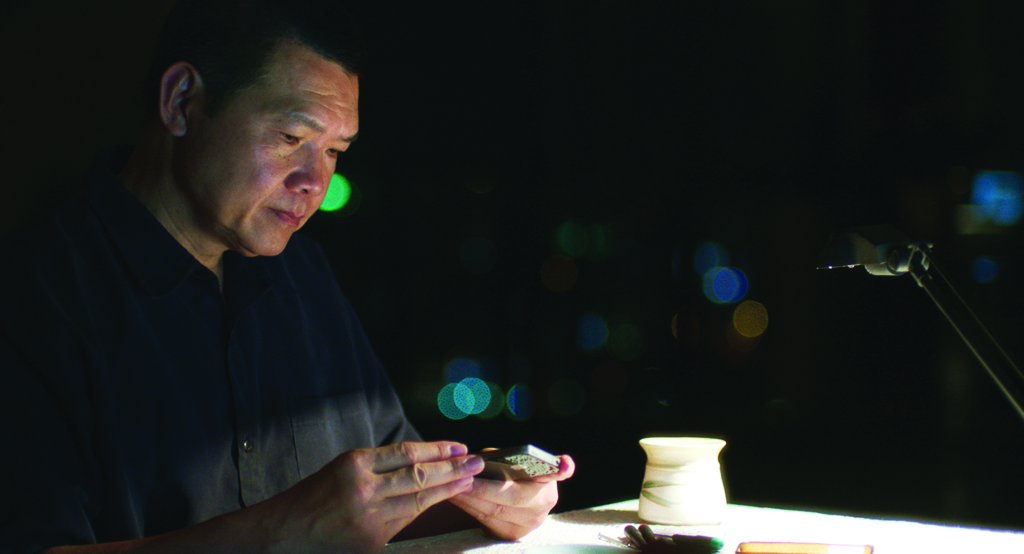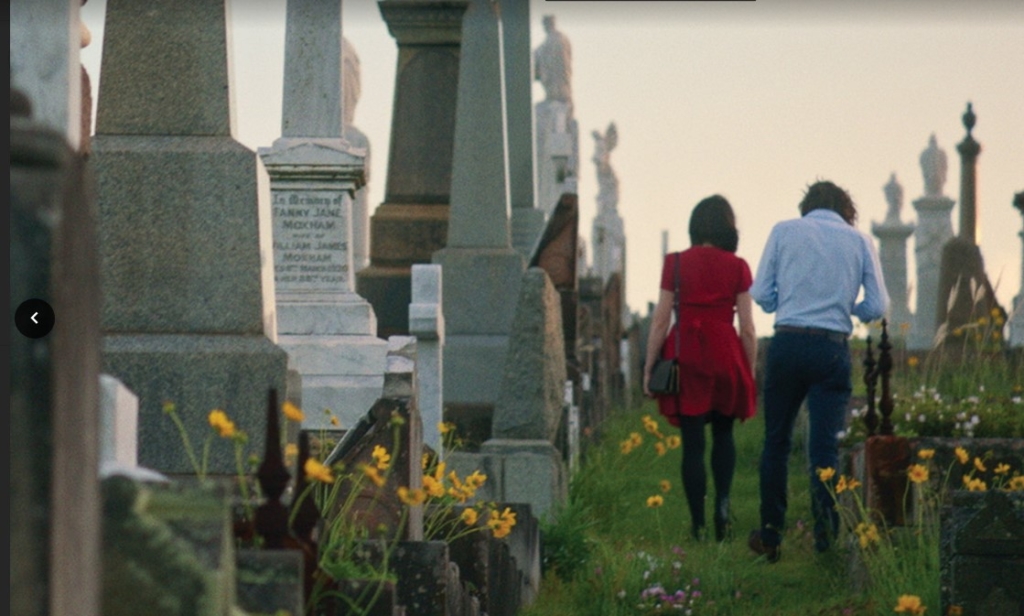‘For the last fifteen years, I have been a frustrated director in an actor’s body.’[1]David Wenham, in Ellipsis post-screening Q&A, Melbourne International Film Festival, 13 August 2017.
When David Wenham made this declaration during a Q&A at the 2017 Melbourne International Film Festival, he had been acting for exactly thirty years. Starting out with bit parts in local television treasures like Sons and Daughters and A Country Practice, he soon became a familiar face for Australian audiences. Though he never made the permanent transition to Hollywood, he did have his fifteen minutes of international fame when he landed the role of Faramir in two of Peter Jackson’s Lord of the Rings films (2002’s The Two Towers and 2003’s The Return of the King). And he’s not done yet. After three decades, Wenham’s career as an actor is still booming; in the past two years alone, he has added to his filmography Ivan Sen’s Goldstone (2016), Garth Davis’ Lion (2016) and three of the most talked-about series on Australian television – Top of the Lake: China Girl and the small-screen reboots of Wake in Fright and Romper Stomper. With no shortage of roles and his passion for acting still very much alive, it wasn’t so much a change as ‘a logical progression’ that drew Wenham to directing. In his words, it was simply ‘a response to the way I’ve worked for thirty years’.[2]ibid.
One sure advantage for such a prolific actor moving into directing is the proverbial industry Rolodex. On home shores, there are few names worth noting whom Wenham hasn’t worked with – and Robert Connolly is foremost on that list. After being cast in Connolly’s The Bank (2001) and Three Dollars (2005), Wenham got his first shot at directing with the 2013 screen adaptation of Tim Winton’s The Turning, on which Connolly worked as a producer. Wenham’s contribution to the anthology film, Commission, clearly gave Connolly confidence in the actor’s abilities as a filmmaker, leading him to sign on as executive producer for Wenham’s feature directorial debut, Ellipsis (2017).
The title, according to Wenham, ‘signifies […] a suspension of time’; the punctuation mark also suggests unpredictability and, most poignantly for the actor-turned-director, that ‘anything is possible after those three dots’.[3]ibid. Indeed, Wenham’s film is a playful exercise in temporal suspension and the exploration of what happens when two characters allow chance and coincidence to guide them through an adventurous night together, without any obligation or expectation other than the arrival of dawn.
Though both its subject and form are a far cry from conventional academic or critical definitions of ‘experimental film’, Ellipsis is an experiment, and accident, of sorts. While Wenham is used to working with tight scripts and larger-scale productions, this project was financially and structurally contained, having come about due to another production not coming to fruition:
I was in the process of making a feature film that I’d worked on for a number of years, and it fell over at the last minute just before shooting began because two pieces of funding fell away […] as a result the cast were here and had put the time aside and we had a little bit of money on the side.[4]David Wenham, quoted in Craig Mathieson, ‘David Wenham Throws Off the Shackles in Directorial Debut Ellipsis’, The Age, 7 June 2017, <http://www.theage.com.au/entertainment/movies/david-wenham-throws-off-the-shackles-in-directorial-debut-ellipsis-20170531-gwh6jr.html>, accessed 24 February 2018.

The resulting micro-budget – combined with a super-short ten-day production schedule (encompassing conceptualisation to workshopping to completed shoot)[5]Arenamedia, Ellipsis press kit, 2017, p. 4. – made the project an exercise in process.
The first three days were spent in a dance studio in Sydney, where Wenham worked closely with actors Emily Barclay and Benedict Samuel to develop their characters, Viv and Jasper. Both actors receive co-writing credits alongside Wenham and Gabrielle Wendelin. In the place of an official shooting schedule and script were character sketches and an overall premise, allowing chance encounters with non-actors, real-life circumstances and improvised dialogue to organically interrupt and re-rail the project. This experimental way of working lends the film its overall atmosphere of spontaneity and is definitely its greatest strength. Over the following seven days, Wenham’s crew of just four filmed sequentially, letting the actors lead the narrative without any rehearsal shots – each scene was captured in a single take.
Comparisons with American independent cinema and French New Wave classics spring quickly to mind, especially John Cassavetes’ seminal beat-generation feature Shadows (1959), which was similarly workshopped and improvised, and Jean-Luc Godard’s iconic Breathless (1960). Richard Linklater’s lo-fi indie hit Before Sunrise (1995) and its sequels, Before Sunset (2004) and Before Midnight (2013), have undoubtedly also influenced Ellipsis, whose scenario is likewise an awkward meet-cute that leads two strangers to hang out over the course of one night. Like Céline (Julie Delpy) and Jesse (Ethan Hawke), Viv and Jasper stumble upon each other and eventually find friendship in an unlikely soulmate.
In Ellipsis, the serendipitous collision is literal: the pair bump into one another at an actual crossroad. Jasper, carelessly absorbed in his mobile phone, walks straight into Viv, who then drops and smashes hers. In an attempt to make amends, he accompanies her to a nearby shop for repairs. Their awkward interaction, and her need to borrow his phone to contact her London-based boyfriend, further leads the pair to the realisation that spending a little time in each other’s company would be no bad thing. For Viv, there is the added incentive of having access to a mobile phone while hers is out of action – an important plot point, as we learn that she is leaving Australia the very next day and awaiting her distant significant other’s return call.
What follows is a comical, compact romp through Sydney that captures the city’s coastal beauty and busy nightlife. ‘The night fascinates me,’ Wenham has said[6]Wenham, op. cit. – and, indeed, the resulting film casts a kind and knowing eye across his home town, particularly Kings Cross and its livelier haunts. A lot of what, and whom, Viv and Jasper encounter in the film is absolutely ‘real’: in a particularly joyous scene, the pair are shown a number of exciting items in a sex shop by enthusiastic sales staff. Another highlight is the couple’s very first stop, when they decide to visit an outdoor sculpture exhibition – only to find, upon arrival, that it’s all packed up and the show is over. Wenham and his team were unaware that the exhibition was no longer running, and it’s these kinds of ‘happy accidents’ that afford the film its most honest and endearing moments. While impersonating outdoor sculptures would have tied the film even more strongly to Cassavetes’ Shadows – which features a scene showing Ben (Ben Carruthers) and Lelia (Lelia Goldoni) doing precisely that at New York’s Museum of Modern Art, to great comic effect – the reality of failed plans is so much more plausible, sincere and, by virtue of its unscripted nature, original.

Because of Ellipsis’ improvised nature – and because even all supposedly improvised set pieces are subject to direction, editing and other processes that mould the work into its final shape – some of the conversations and motifs in the film feel prepared, if not rehearsed. This leads some moments that ought to be sweetly sentimental to instead feel hokey. In one scene, the pair visit poet Henry Lawson’s grave, and it seems as though Wenham is deliberately tipping his hat to a long line of great storytellers. Elsewhere, Jasper mansplains Leonardo da Vinci to Viv in a way that is cringingly reminiscent of how Woody Allen’s alter egos condescend to their female counterparts in his creepy male-fantasy wish-fulfilment films. While the comparisons to Cassavetes and Linklater evoked by Ellipsis are the most obvious (and complimentary), the misogynistic echoes of Allen in Wenham’s film are nevertheless evident – and much harder to swallow.
It’s also difficult to get away from the weighty implications embedded in the film’s subplot around systemic racism and encounters with the big ‘O’: the ‘Other’. On the eleventh day of production, allocated to editing, Wenham decided to add another shoot day to explore a second, lesser story strand.[7]Arenamedia, op. cit. The unnamed phone repairman (played by Ferdinand Hoang) was given a number of extra scenes to show viewers how difficult it is for immigrants to pass the Australian citizenship test and attain our equivalent of the American Dream: a fair go. While the intention feels earnest, the execution has the sense of being tacked on – our unnamed immigrant is still just part of a subplot serving the greater white, heteronormative narrative of Viv and Jasper’s serendipitous night on the town.
This interaction recalls an earlier scene in which the pair meet an Indigenous Australian man who appears disoriented or intoxicated. Though the interaction is harmless enough at first glance – a friendly chat with a stranger on the street – it soon moves into darker territory as the man’s stories point to the irreparable impacts of colonisation. These two encounters with the ‘Other’ can’t but highlight the systemic privilege of this white couple, whose meet-cute involves bonding over the smash and repair of an expensive object of capitalistic dominance, and having the mobility to enter and depart a space of dispossession. While this may be too heavy-handed a reading of what is intended to be a lighthearted experiment in process, the social responsibility of art and its ideological influence on audiences should not be discounted.
Beyond its problematic politics, Ellipsis is – at its best – a delightful piece of whimsy designed to melt hearts. And, even as far back as 2013, Wenham was already assured of the ability of actors to bring something to the filmmaking table that directors without that experience simply cannot. ‘The great thing that we have as actors [is that] we have worked with dozens of directors,’ he has explained.
A director has never worked with another director. So we have all that experience with what actually does work and what doesn’t […] I think that gives us a huge advantage as directors. Not just for directing actors but for working with crews and being aware of what a camera can do and what you can actually do (with the camera).[8]David Wenham, quoted in Sharon Kennedy, ‘David Wenham on Acting, Directing, and Being a Performing Monkey’, ABC South West WA, 27 August 2013, <http://www.abc.net.au/local/stories/2013/08/27/3834688.htm>, accessed 21 February 2018.

From a viewer’s perspective, it is clear that Ellipsis is an actor’s movie. There is no doubt in my mind that it must have been enthralling for Wenham and his stars to work in such an improvised and free way. But what the film has gained in creativity and autonomy – and perhaps even truth, in light of its discarding of scripted performance – it has lost in thematic and ideological precision.
Endnotes
| 1 | David Wenham, in Ellipsis post-screening Q&A, Melbourne International Film Festival, 13 August 2017. |
|---|---|
| 2 | ibid. |
| 3 | ibid. |
| 4 | David Wenham, quoted in Craig Mathieson, ‘David Wenham Throws Off the Shackles in Directorial Debut Ellipsis’, The Age, 7 June 2017, <http://www.theage.com.au/entertainment/movies/david-wenham-throws-off-the-shackles-in-directorial-debut-ellipsis-20170531-gwh6jr.html>, accessed 24 February 2018. |
| 5 | Arenamedia, Ellipsis press kit, 2017, p. 4. |
| 6 | Wenham, op. cit. |
| 7 | Arenamedia, op. cit. |
| 8 | David Wenham, quoted in Sharon Kennedy, ‘David Wenham on Acting, Directing, and Being a Performing Monkey’, ABC South West WA, 27 August 2013, <http://www.abc.net.au/local/stories/2013/08/27/3834688.htm>, accessed 21 February 2018. |





